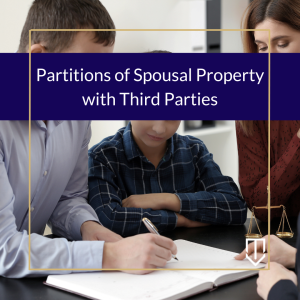 Family Code section 2021 provides that a court “may order that a person who claims an interest in the proceeding be joined as a party” to nullity, dissolution, and legal separation proceedings. (Fam.C. § 2021(a).) An interested third party may wish to join a family law proceeding, or an existing party may want to join the interested individual. An existing party may request that the court join the third party if the third party possesses or claims to own property that the court has jurisdiction over in the proceeding. (Cal. Rules of Court 5.24(c)(1).) Additionally, a third party may request to be joined if they have been served a temporary restraining order that affects their ability to use property they possess or claim to own.
Family Code section 2021 provides that a court “may order that a person who claims an interest in the proceeding be joined as a party” to nullity, dissolution, and legal separation proceedings. (Fam.C. § 2021(a).) An interested third party may wish to join a family law proceeding, or an existing party may want to join the interested individual. An existing party may request that the court join the third party if the third party possesses or claims to own property that the court has jurisdiction over in the proceeding. (Cal. Rules of Court 5.24(c)(1).) Additionally, a third party may request to be joined if they have been served a temporary restraining order that affects their ability to use property they possess or claim to own.
When will courts order joinder in Family Law?
When a claimant has a property interest at stake and is requested to be joined, the court has the discretion to decide whether the claimant will be joined as a party. (Schnabel v. Superior Court (1994) 30 Cal.App.4th 758, 762-63.) In other words, the court is allowed to deny a request for joinder even if the individual seeking it has a legitimate interest in the proceeding. This is called a “permissive” joinder. Joinders are mandatory only when the party sought to be joined has or claims physical custody or visitation of a minor child involved in the family law proceeding. (Cal. Rules of Court 5.24(e)(1).)
 California Partition Law Blog
California Partition Law Blog













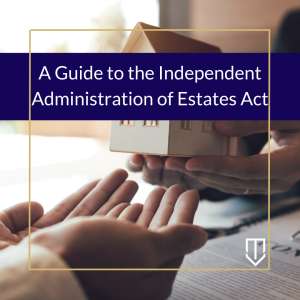 The Probate process can be intimidating and confusing. In addition to having to deal with the death of a loved one, adding the resolution of legal and real estate issues on top of everything else can feel like a lot.
The Probate process can be intimidating and confusing. In addition to having to deal with the death of a loved one, adding the resolution of legal and real estate issues on top of everything else can feel like a lot. The Corporate Transparency Act of 2020 (the “CTA”) is a Federal law set to go into effect on January 1, 2024. It forces certain members of businesses (those who formed them and those who own large portions of the entity) to report sensitive information to the Federal Government.
The Corporate Transparency Act of 2020 (the “CTA”) is a Federal law set to go into effect on January 1, 2024. It forces certain members of businesses (those who formed them and those who own large portions of the entity) to report sensitive information to the Federal Government.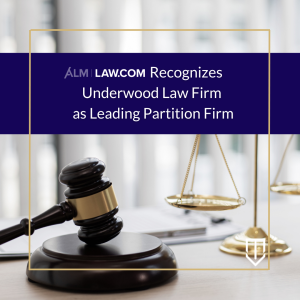 Underwood Law Firm is a finalist for the California Legal Awards’ Vanguard Award.
Underwood Law Firm is a finalist for the California Legal Awards’ Vanguard Award. The statutory LLC buyout is a special remedy designed for lawsuits seeking to
The statutory LLC buyout is a special remedy designed for lawsuits seeking to  When business entities become subject to internal dissension, it’s not uncommon for several members to approach the court system and seek to dissolve the entity. Often, this is in the best interest of all involved.
When business entities become subject to internal dissension, it’s not uncommon for several members to approach the court system and seek to dissolve the entity. Often, this is in the best interest of all involved.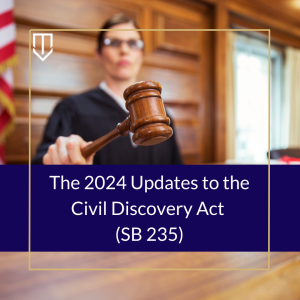 In almost all civil litigation in California, a major issue is the formal process of exchanging information and documents that address claims or defenses in dispute between the parties. In this system, discovery is “self-executing.” That means that no party to the lawsuit has any obligation to provide any information, unless requested through the formal methods outlined in the Civil Discovery Act.
In almost all civil litigation in California, a major issue is the formal process of exchanging information and documents that address claims or defenses in dispute between the parties. In this system, discovery is “self-executing.” That means that no party to the lawsuit has any obligation to provide any information, unless requested through the formal methods outlined in the Civil Discovery Act. Before undertaking litigation over real estate in California, title insurance can help to provide clarity as to important ownership questions. Title insurance is not just nice to have, in many instances, the law specifically envisions that the parties will obtain a title report of some type. For example,
Before undertaking litigation over real estate in California, title insurance can help to provide clarity as to important ownership questions. Title insurance is not just nice to have, in many instances, the law specifically envisions that the parties will obtain a title report of some type. For example, 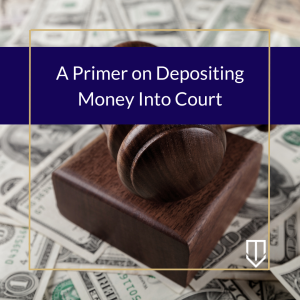 Under certain special circumstances, money can be deposited with the court to safeguard during lawsuits under Code of Civil Procedure sections 572 and 573. The justification for such a rule is that, if the court doesn’t protect the money, the other party may spend it, rendering a plaintiff’s victory somewhat hollow.
Under certain special circumstances, money can be deposited with the court to safeguard during lawsuits under Code of Civil Procedure sections 572 and 573. The justification for such a rule is that, if the court doesn’t protect the money, the other party may spend it, rendering a plaintiff’s victory somewhat hollow.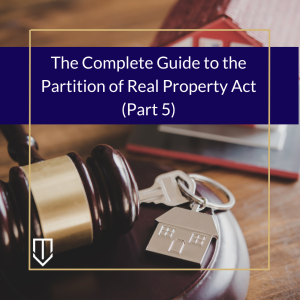 Just as there are special provisions for defaulting parties with
Just as there are special provisions for defaulting parties with